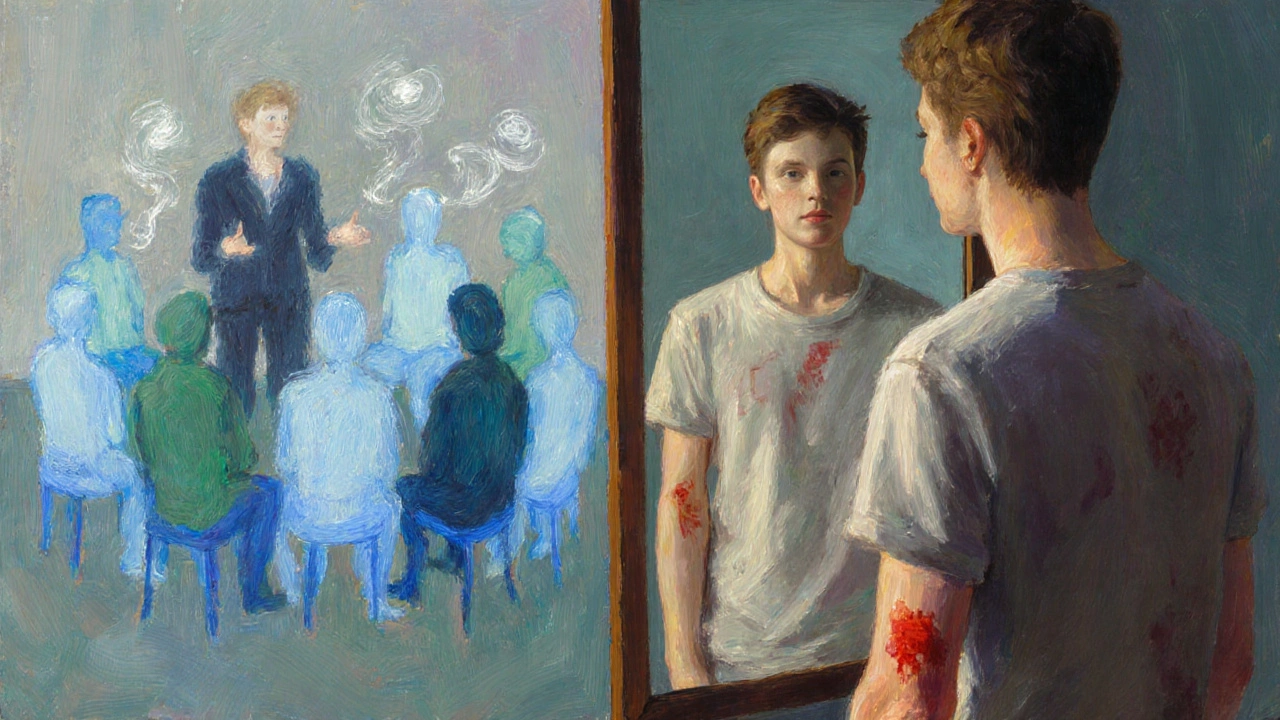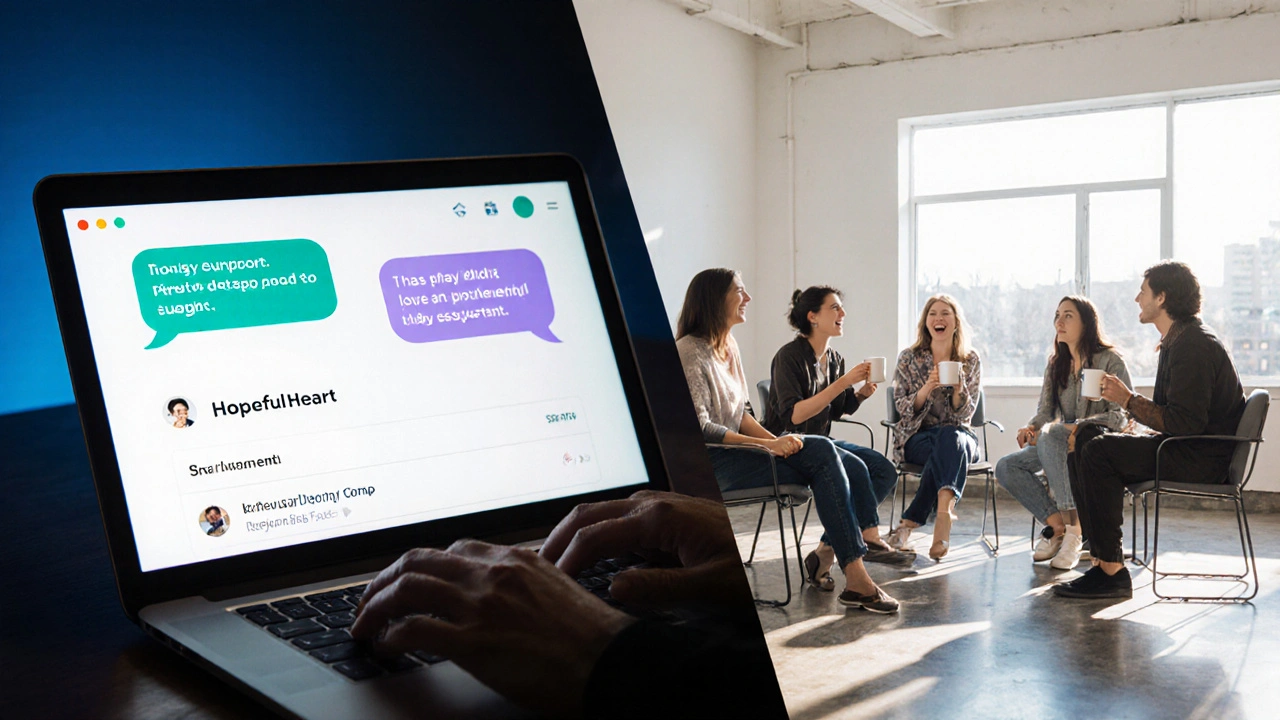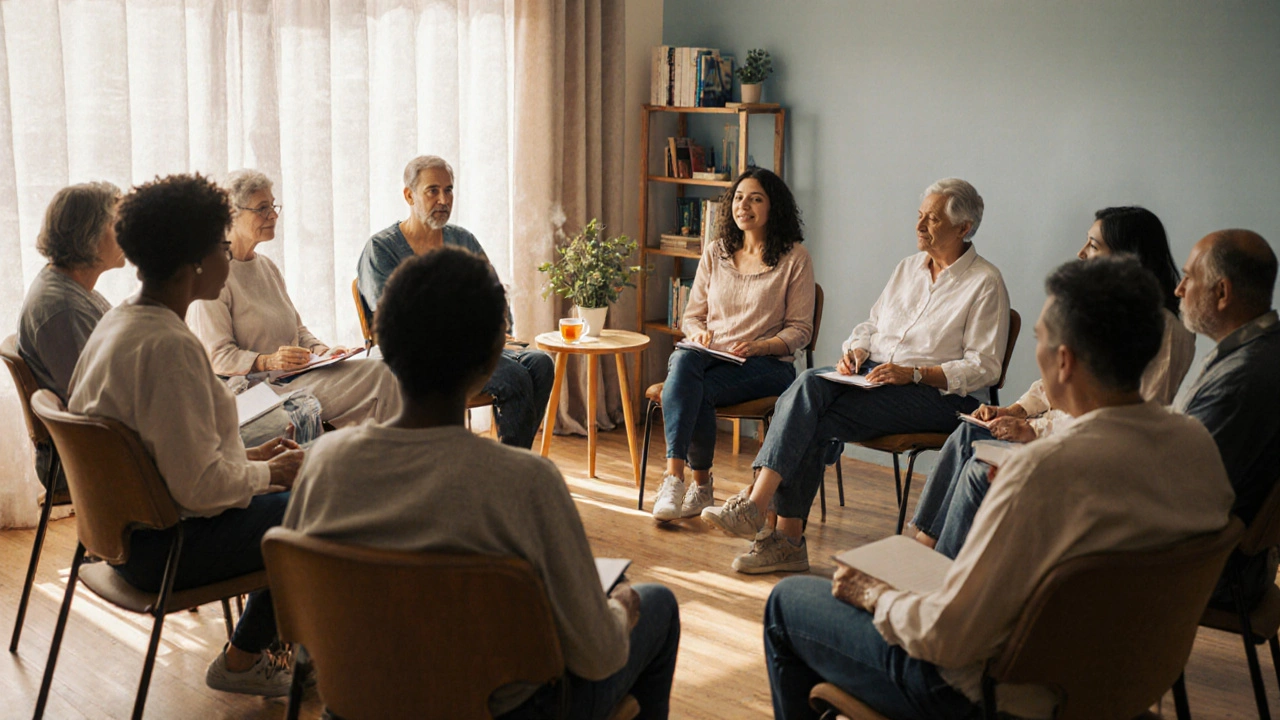Scar Support Group Finder
Online Forum
Digital platforms offering asynchronous communication, ideal for those seeking flexibility and anonymity.
Flexible AnonymousFace-to-Face Meeting
In-person gatherings providing deeper connections and immediate feedback from peers and facilitators.
Personal StructuredFind Your Perfect Support Group Match
Recommended Support Group Type
Complete the form to receive personalized recommendations based on your preferences.
Comparison Table
| Feature | Online Forum | Face-to-Face Meeting |
|---|---|---|
| Accessibility | 24/7 access from any device | Requires travel, set schedule |
| Anonymity | Can use pseudonyms, safer for shy members | Real-time interaction, facial cues visible |
| Facilitation | Often peer-moderated | Usually led by a psychologist or trained facilitator |
| Emotional depth | May be surface-level due to text format | Deeper sharing enabled by personal presence |
| Community building | Long-term threads, flexible participation | Strong bond through shared activities (e.g., art therapy) |
Quick Takeaways
- Support groups provide safe spaces to share experiences and reduce isolation.
- Both online and face‑to‑face formats have distinct strengths; choose what fits your lifestyle.
- Professional facilitation by a psychologist or trained peer can boost confidence and coping skills.
- Regular attendance correlates with higher self‑esteem and better body image.
- Start by searching local hospital programs, community centres, or reputable online forums.
Understanding Scars and Their Emotional Impact
When skin tissue repairs itself after an injury, the result is a Scar a mark of healed tissue that can vary in size, colour and texture. While the physical appearance often fades in a few months, the psychological imprint can linger much longer. Many people report feelings of anxiety, self‑consciousness, or even post‑traumatic stress because a scar serves as a constant visual reminder of the event that caused it.
That emotional impact refers to the range of feelings-sadness, shame, anger, or frustration-that arise when a person perceives a scar as a flaw. Studies from Australian dermatology clinics in 2023 show that up to 40% of patients with visible scars experience decreased self‑esteem, and a significant portion avoid social situations or intimate relationships.
Why Support Groups Matter
A Support group is a structured gathering where individuals facing similar challenges share stories, advice, and encouragement offers a unique blend of peer empathy and expert guidance. Unlike one‑off therapy sessions, groups create a communal narrative that normalises the scar experience, turning isolation into solidarity.
Research from the University of Melbourne (2022) found that participants in a 12‑week scar support programme reported a 25% reduction in anxiety scores and a 15% boost in body‑image satisfaction compared with a control group receiving only written resources.

Types of Support Groups
Not every group looks the same. Here are the most common formats you’ll encounter:
- Online forum a digital platform-often a private Facebook group or dedicated website-where members post updates, ask questions, and comment asynchronously.
- Face‑to‑face meeting a scheduled gathering in a community centre, hospital, or therapy office where participants interact in real time.
- Therapist‑led group a session moderated by a licensed psychologist or counsellor, blending clinical techniques with peer sharing.
- Peer‑mentoring circle a small, self‑organized group where members rotate leadership and share coping strategies based on lived experience.
How to Find and Join a Group
- Identify your preference: online convenience vs in‑person connection.
- Search reputable sources: hospital dermatology departments, local mental‑health charities, or national scar‑awareness organisations (e.g., Australian Burns Association).
- Check the facilitator’s credentials-ideally a psychologist or certified peer‑support leader.
- Read member reviews or ask for a trial session to gauge group dynamics.
- Register using the provided email or phone contact; many groups offer a free introductory meeting.
When you first attend, bring a brief personal story and a few questions you’d like answers to. This helps the group’s facilitator tailor the discussion to your needs.
What to Expect in Sessions
Typical meetings follow a loose structure:
- Check‑in: each member shares a quick update on mood or recent scar‑related challenges.
- Skill segment: a psychologist may teach breathing exercises, cognitive‑restructuring, or body‑positive affirmations.
- Peer discussion: participants exchange coping tips-like choosing clothing that conceals or accentuates the scar, or using scar‑removal creams.
- Goal setting: members set small, measurable objectives (e.g., wearing a sleeveless shirt once a week).
These components target two core outcomes: reducing the emotional impact and improving self‑esteem the personal sense of worth and confidence.

Best Practices & Common Pitfalls
Do attend consistently-weekly or bi‑weekly meetings give the brain time to rewire negative thought patterns.
Don’t expect instant transformation; emotional healing is a gradual process.
Watch out for groups that discourage professional help, over‑emphasise “miracle cures”, or have members who dominate conversations. A healthy group respects confidentiality, encourages diverse voices, and keeps the focus on coping rather than competition.
Engaging a qualified psychologist a mental‑health professional trained in trauma‑informed care can prevent these traps and provide evidence‑based techniques.
Comparison: Online vs Face‑to‑Face Support Groups
| Feature | Online Forum | Face‑to‑Face Meeting |
|---|---|---|
| Accessibility | 24/7 access from any device | Requires travel, set schedule |
| Anonymity | Can use pseudonyms, safer for shy members | Real‑time interaction, facial cues visible |
| Facilitation | Often peer‑moderated | Usually led by a psychologist or trained facilitator |
| Emotional depth | May be surface‑level due to text format | Deeper sharing enabled by personal presence |
| Community building | Long‑term threads, flexible participation | Strong bond through shared activities (e.g., art therapy) |
Choosing the right format depends on your comfort level, schedule, and whether you need professional guidance. Many people start online for convenience and transition to in‑person groups once they feel ready.
Frequently Asked Questions
Can I join a support group if I only have a small scar?
Absolutely. Support groups welcome anyone who feels the scar, regardless of size, because the emotional response is personal, not proportional to the mark.
Do I need a therapist to start a peer‑mentoring circle?
No, but having a mental‑health professional review your group’s guidelines can keep the space safe and effective.
How often should I attend meetings to see benefits?
Most studies suggest a minimum of weekly attendance for 8-12 weeks to notice measurable reductions in anxiety and improvements in self‑esteem.
Are there free support groups in Australia?
Yes. Public hospitals, charities like the Australian Burns Association, and many community health centres run free or low‑cost groups.
What if I feel uncomfortable sharing my story?
Start by listening. Most groups allow silent participation at first, and you can share when you feel ready.
Next Steps
Take the first action today: search for a scar support groups listing in your city or browse a reputable online forum. Bring a notebook, jot down any questions, and commit to at least three sessions. You’ll soon notice a shift from feeling isolated to feeling understood, and that emotional lift is the first real step toward healing.


The therapeutic value of scar support groups is simply unparalelled, obviously.